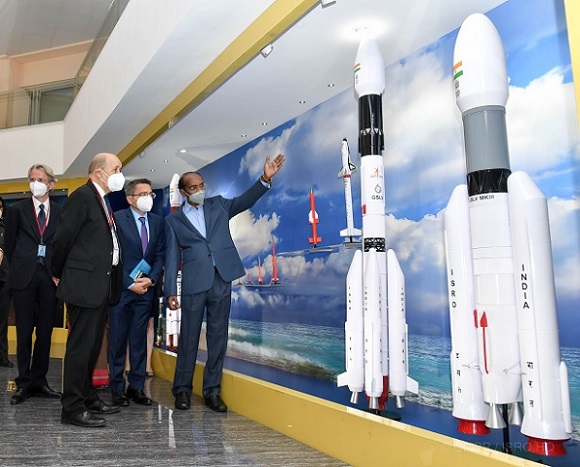The decades-long Indo-French space cooperation is going stratospheric with the French National Space Agency (CNES) announcing that it would share its expertise in space medicine to push India's Gaganyaan human spaceflight mission.
The decision was announced during the visit of Jean-Yves Le Drian, France's Minister for Europe and Foreign Affairs, during his visit to the headquarters of the Indian Space Research Organisation (ISRO) following discussions with the organisation's chairman K. Sivan and other senior officials Thursday.
The ISRO chief presented the evolution and achievements of Indian space programme, India-France space cooperation and details of the recent space reforms announced by the Indian government to the visiting delegation. At the HSFC, the details of India’s Human space flight programme 'Gaganyaan' were also explained to the French Foreign Minister, including the full-size model of crew module.
The first space agreement between France and India dates back to 1964. During his visit to France in August 2019, and directly in line with the Joint Vision adopted during the India visit of French President Emmanuel Macron in March 2018, both India and France had decided to deepen their space cooperation so as to meet new challenges together, whether it concerns planetary exploration or human spaceflight. It included the decision to train medical support personnel for Indian astronauts, who will be part of the country's manned space mission.

The existing partnerships between the two nations cover almost all areas of space activity. ISRO will also be launching the joint Oceansat 3-Argos mission this year. With the new agreement, France will be taking part in the great technological and human challenge, that is the Gaganyaan programme.
The Gaganyaan orbital spacecraft project was kicked off in August 2018. It originally intended to send aloft an astronaut from Indian soil to mark the 75th anniversary of the country’s independence in 2022. Test flights will carry an instrumented humanoid robot. The capsule will orbit at an altitude of 400 kilometres for seven days before splashing down in the Arabian Sea off the coast of Ahmedabad.
ISRO has asked CNES to help prepare for Gaganyaan missions and to serve as its single European contact in this domain. Under the terms of the agreement, CNES will train India’s flight physicians and CAPCOM mission control teams in France at the CADMOS centre for the development of microgravity applications and space operations at CNES in Toulouse and at the European Astronaut Centre (EAC) in Cologne, Germany.
The agreement provides for CNES to support implementation of a scientific experiment plan on validation missions, exchange information on food packaging and the nutrition programme, and above all the use by Indian astronauts of French equipment, consumables and medical instruments. French equipment developed by CNES, tested and still operating aboard the International Space Station (ISS) will thus be made available to Indian crews.
Thomas Pesquet, who is set to make his second flight to the ISS on April 22 for the Alpha mission, had previously tested these devices on his first spaceflight. Lastly, CNES will also be supplying fireproof carry bags made in France to shield equipment from shocks and radiation.
This cooperation could be extended in the future to parabolic flights operated by Novespace to test instruments and for astronaut training, as well as technical support for construction of an astronaut training centre in Bangalore. Ultimately, ISRO would like to leverage CNES’s experience in long-duration spaceflights with a view to developing an Indian space station.
Deepening India-France friendship
The visit of French Foreign Minister is the third high-level official visit from Paris in last four months, following the bilateral Strategic Dialogue on January 7 and the visit of the French Minister for Ecological Transition the same month.
Earlier this week, Jean-Yves Le Drian and External Affairs Minister, Dr. S. Jaishankar, recognised the immense opportunities for greater collaboration in diverse sectors such as trade and investments, defence and security, health, education, research and innovation, energy and climate change in the context of a Covid-impacted world.

Their talk covered all aspects of the bilateral strategic partnership, joint initiatives in the Indo-Pacific, regional and global issues of common interest, and cooperation in the United Nations Security Council, where India currently sits as an elected member.
France and India also enjoy long-standing and very dynamic economic relations. India's bilateral trade with France has witnessed a steady rise in the last decade reaching USD 10.75 billion in 2020. French companies have been investing in India for decades and are fully committed to Make in India. Today, there are more than 600 French companies in India employing more than 350 000 people, with a strong presence in sectors such as digital technology, aeronautics, automotive, defence and renewable energy. Indian investments in France are also increasing.
To tap the full potential of bilateral trade and economic relations, both sides recognised the importance of fast tracking the discussions on an India-EU trade and investment agreement. Jaishankar and his counterpart also held discussions on a number of regional and global issues of mutual interest reiterating their shared commitment to a multipolar world and faith in multilateralism. They explored ways to strengthen cooperation in the Indo-Pacific, including the India-France-Australia Trilateral mechanism, addressing emerging challenges in the maritime and space domains and working together in the area of climate action and biodiversity protection.
India welcomed France’s decision to take up the 'Maritime Resources' pillar of India’s Indo-Pacific Oceans Initiative (IPOI).
Last year, during a meeting of Joint Working Group on Counter Terrorism, both countries had exchanged views on current counter-terrorism challenges including countering radicalization, combating financing of terrorism, preventing use of internet for terrorist purposes, threats posed by internationally designated terrorist entities as well as cross-border terrorism in South Asian region.
On the defence front, the induction of Rafale into the Indian Air Force has given a huge fillip to the strong ties between the two countries which remain rock solid and time tested.




















